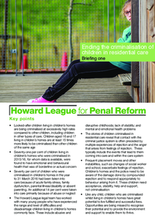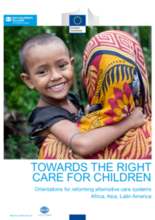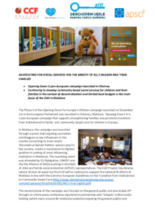Displaying 911 - 920 of 1482
This is the first in a series of briefings to be published alongside a programme of research and campaign work to end the criminalisation of children living in residential care. The project builds on from research published in March 2016, which found that children living in children’s homes in the UK were being criminalised at much higher rates than other children, including those in other types of care.
This study contributes to the emerging body of South African literature on care leaving, as it explores the future selves and resilience factors of young people who are still in residential care and who are about to exit the statutory system.
The objective of this study was to undertake the first systematic census of background, care type and placement stability characteristics of young people living in the out-of-home care sector in Australia.
The aim of the paper is to explore selected pertinent challenges that impede child and youth care centres (CYCCs) from providing holistic support and care to children found in need of care as stated in the Children’s Act No. 38/2005.
The paper presents a detailed analysis of the Russian official statistics for orphans and children placed out of parental care.
The general objective of this study was to conduct a research on the possible issue of institutionalisation in six South and Central American, Asian and African countries in order to strengthen the knowledge of the European Commission on the nature, the extent and scope of institutionalisation and feasibility of de-institutionalisation (alternative care for children).
This report from Opening Doors discusses the Opening Doors II pan-European campaign launched in Chisinau.
This newsletter issue from Senator Linda Reynolds of Western Australia, written in conjunction with Kate van Doore of Griffith Law School, was written in preparation for the Australian Parliamentary inquiry on modern slavery and describes the ways in which orphanage trafficking constitutes modern-day slavery.
Extracting on chronologic data, this book discusses the politics and practice of intercountry adoption starting with the state international adoption to in the 1950s continuing to present-day adoption practice and protections.
This paper presents qualitative findings of the resilience processes of young women who have left the care of Child and Youth Care Centres in Gauteng, South Africa.




